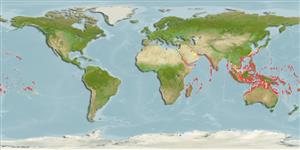Common names from other countries
Teleostei (teleosts) >
Acanthuriformes (Surgeonfishes) >
Acanthuridae (Surgeonfishes, tangs, unicornfishes) > Acanthurinae
Etymology: Ctenochaetus: Greek, kteis, ktenos = comb + Greek, chaite = hair (Ref. 45335).
More on authors: Quoy & Gaimard.
Environment: milieu / climate zone / depth range / distribution range
Ecology
Marine; reef-associated; depth range 0 - 60 m (Ref. 128797), usually 6 - 30 m (Ref. 58652). Tropical; 24°C - 28°C (Ref. 27115); 35°N - 34°S, 99°E - 77°W
Indo-Pacific: throughout the region except the Hawaiian, Marquesas and Easter islands. Record from Baker Island (US Minor Islands) based on a photograph (Ref. 42056). Absent from Malden and Jarvis islands (Ref. 1602).
Length at first maturity / Size / Weight / Age
Maturity: Lm ?, range 10 - ? cm
Max length : 26.0 cm TL male/unsexed; (Ref. 2334); common length : 18.0 cm TL male/unsexed; (Ref. 3146); max. published weight: 437.00 g (Ref. 125599); max. reported age: 36 years (Ref. 52229)
Dorsal
spines
(total): 8;
Dorsal
soft rays
(total): 27-31;
Anal
spines: 3;
Anal
soft rays: 24 - 28. This species is distinguished by the following characters: body deep and compressed, its depth 1.9-2.3 times in standard length or SL; mouth small, teeth numerous (> 30 in jaws of adults), movable, slender and elongate, with expanded incurved tips which are denticulate on the lateral margin (6 denticulations on upper and 4 on lower teeth); total gill rakers on first gill arch 27-36; a continuous unnotched dorsal fin with VIII,27-31; AIII,24-28; caudal fin lunate, concavity 3.7-6 times in SL; a lancet-like spine on caudal peduncle which folds into a deep horizontal groove; colour dark olive to yellowish brown with blue or blue-grey lengthwise lines on body and small orange spots on head and nape; dorsal and anal fins with about 5 lengthwise dark bluish bands; pectoral fins pale with brownish yellow rays; a small blackish spot at rear base of dorsal fin of juveniles and small adults (Ref. 9808).
Inhabits reef flats and lagoon and seaward reefs to a depth of over 30 m. Occurs over coral (Ref. 58534), rock, pavement, or rubble substrates. May occur singly or in small to very large, often mixed-species aggregations (Ref. 48637). Feeds on surface film of blue-green algae and diatoms (making this species a key link in the ciguatera food chain) as well as on various small invertebrates.
Life cycle and mating behavior
Maturity | Reproduction | Spawning | Eggs | Fecundity | Larvae
In Tahiti, spawning starts near full moon with the formation of schools of several thousand fish at various depths. The fish remain almost motionless for between 1 to 3 hrs, then change their normal color to pale grey. About 4 or 5 fishes rise a few yards above main school and swim around each other discharging milt and eggs, then return to former place and replaced by another group to spawn.
Randall, J.E and K.D. Clements, 2001. Second revision of the surgeonfish genus Ctenochaetus (Perciformes: Acanthuridae), with descriptions of two new species. Indo-Pac. Fish. (32):33 p. (Ref. 42056)
IUCN Red List Status (Ref. 130435)
CITES (Ref. 128078)
Not Evaluated
Threat to humans
Reports of ciguatera poisoning (Ref. 9513)
Human uses
Fisheries: commercial; aquarium: commercial
More information
ReferencesAquacultureAquaculture profileStrainsGeneticsElectrophoresesHeritabilityDiseasesProcessingMass conversion
Tools
Special reports
Download XML
Internet sources
Estimates based on models
Preferred temperature (Ref.
115969): 24.6 - 29, mean 27.8 (based on 1078 cells).
Phylogenetic diversity index (Ref.
82804): PD
50 = 0.5020 [Uniqueness, from 0.5 = low to 2.0 = high].
Bayesian length-weight: a=0.02344 (0.01927 - 0.02851), b=2.97 (2.92 - 3.02), in cm Total Length, based on LWR estimates for this species (Ref.
93245).
Trophic level (Ref.
69278): 2.0 ±0.0 se; based on diet studies.
Resilience (Ref.
120179): Low, minimum population doubling time 4.5 - 14 years (tmax = 36; K=0.87).
Prior r = 0.44, 95% CL = 0.29 - 0.66, Based on 1 stock assessment.
Fishing Vulnerability (Ref.
59153): Low vulnerability (16 of 100).
